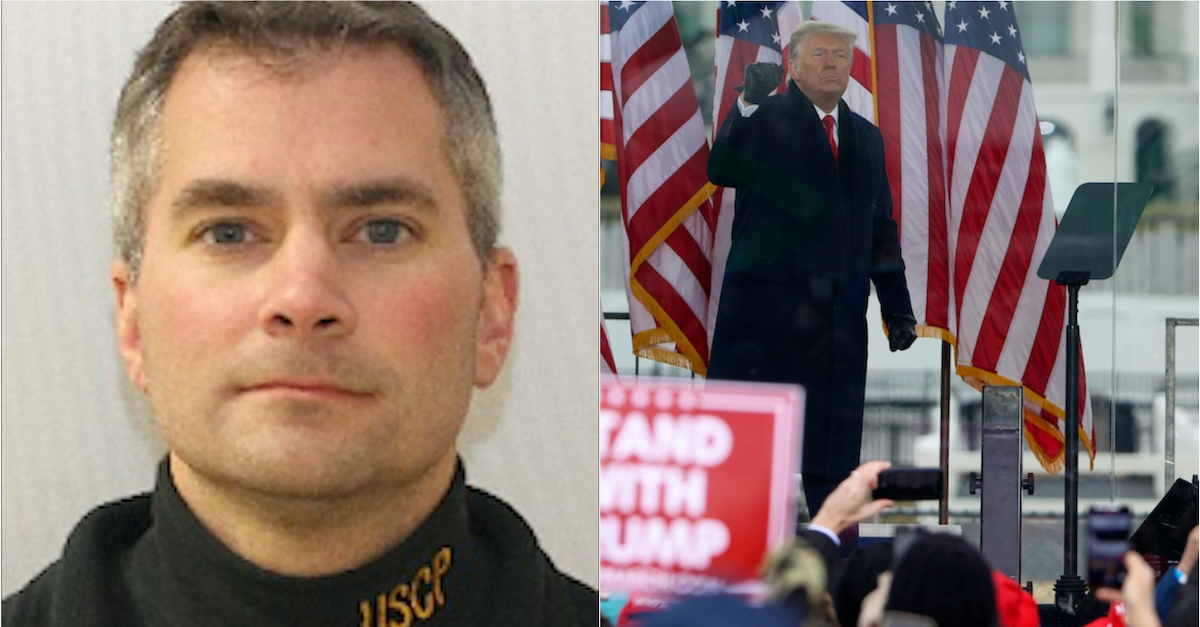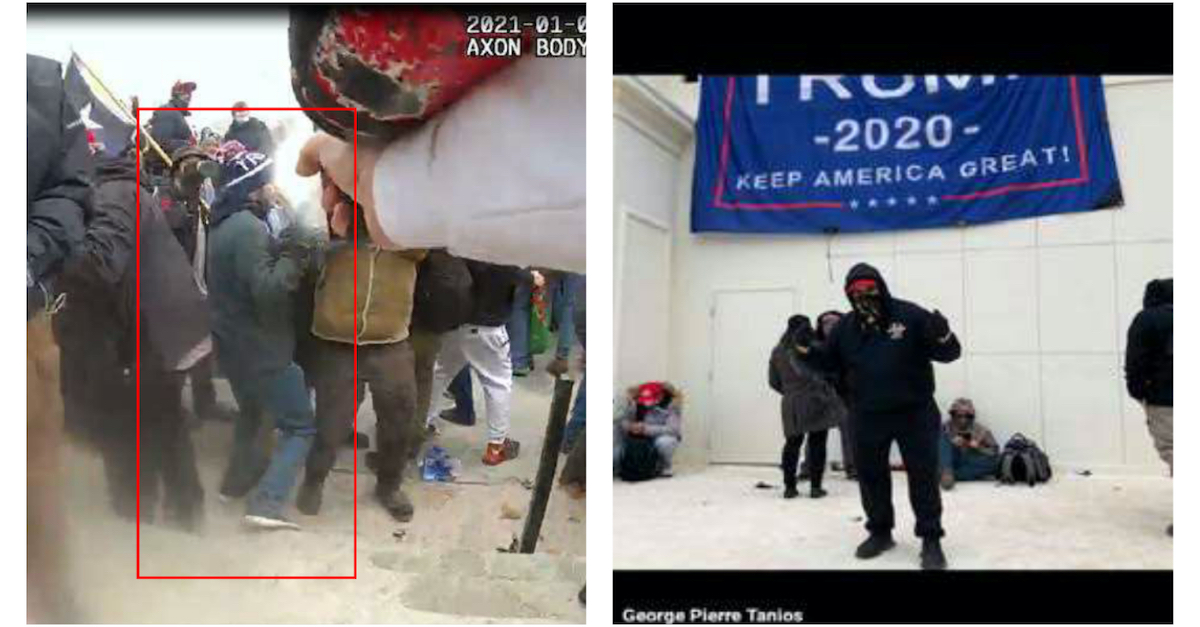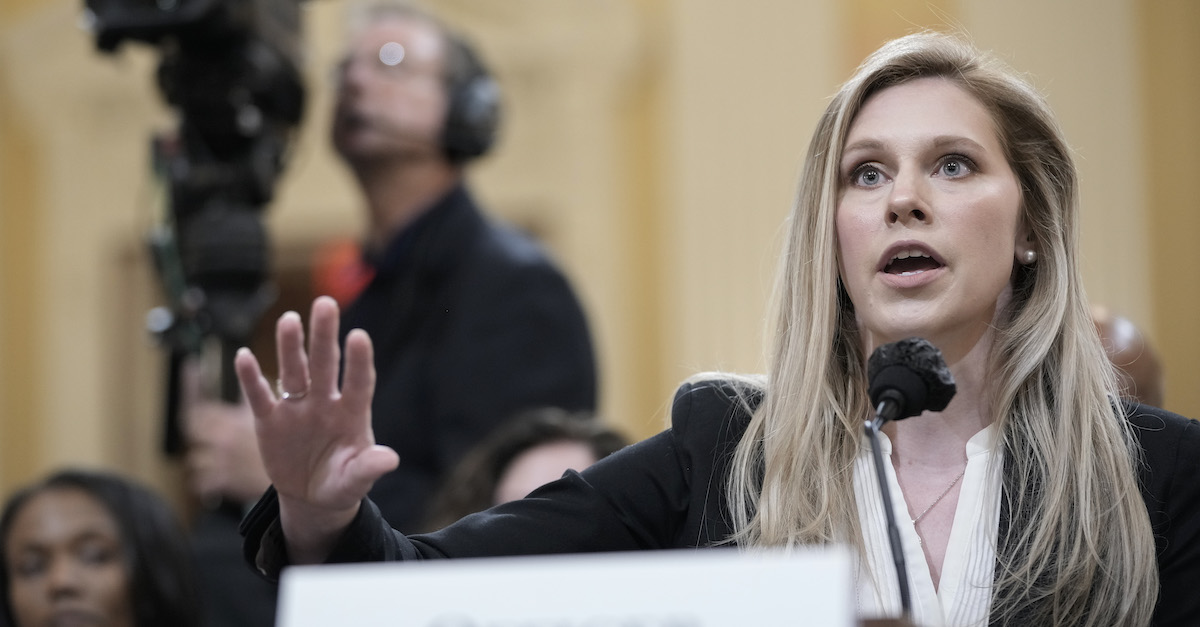
Fallen Capitol Police Officer Brian Sicknick’s estate sued Donald Trump for “inciting” the riot that included a pepper spray attack on him. (Photo of Sicknick via Capitol Police; Photo of Trump via Tasos Katopodis/Getty Images)
In a lawsuit filed on the eve of the second anniversary Jan. 6th attack on the U.S. Capitol, the estate of Brian Sicknick sued former President Donald Trump for allegedly “inciting” the riot that led to a pepper spray attack on the fallen officer.
The estate, represented by Sicknick’s longtime partner Sandra Garza, also sued the two men charged in connection with the attack: Julian Khater and George Tanios.
“As a direct and foreseeable consequence of Defendant Trump’s false and incendiary allegations of fraud and theft, and in direct response to Defendant Trump’s express calls for violence at the rally, a violent mob attacked the U.S. Capitol,” the 47-page complaint states. “Many participants in the attack have since revealed that they were acting on what they believed to be Defendant Trump’s direct orders in service of their country.”
The lawsuit seeks at least $10 million, plus punitive damages, from “each” of the defendants for wrongful death, conspiracy to violate civil rights, and negligence per se. The wrongful death claim is brought under District of Columbia law, which has a two-year statute of limitations.
Khater and Tanios face a separate count of common-law assault — and Trump faces a separate account for allegedly aiding and abetting it.
“Put in Mortal Danger”
Two years ago today, Sicknick had been defending the U.S. Capitol from a riotous mob when Khater allegedly doused him with chemical spray at around 2:20 p.m. Eastern Time. The officer collapsed at the hospital some eight hours later around 10 p.m. and was pronounced dead the following night.
As the lawsuit notes, a starkly different scene unfolded at the White House at the time of the attack.
“As Officer Sicknick and hundreds of others—including other police officers, elected officials, and rank-and-file workers at the U.S. Capitol—were put in mortal danger, and as the seat of American Democracy was desecrated by the insurgent mob, Defendant Trump watched the events unfold on live television from the safety of the White House,” the lawsuit alleges. “Those with knowledge claimed that during this moment of national horror, Defendant Trump was ‘delighted’ and was ‘confused about why other people on his team weren’t as excited as he was.’ Others described Defendant Trump as ‘borderline enthusiastic’ about the unfolding violence.”
Several developments from in and outside court since the U.S. Capitol breach could either help, or prove challenging to, the estate’s lawsuit.
The D.C. Medical Examiner’s ruling about Sicknick’s death proved murky, finding that the officer died of “natural causes,” while at the same time releasing a statement asserting that his defense of the Capitol “played a role in his condition.”

George Tanios and Julian Elie Khater were both initially charged in the Sicknick pepper spray attack. Only Khater pleaded guilty to assaulting the officers. (Photos via DOJ)
Khater and Tanios, the men charged in connection with the attack, were never accused of Sicknick’s murder, and only one of them admitted to assaulting an officer.
Tanios ultimately pleaded down to misdemeanor charges unconnected to the Sicknick assault. Prosecutors had accused Tanios of coordinating the attack — and Khater of actually deploying the spray. Court papers quote Khater asking Tanios: “Give me that bear shit.”
“Imminent Lawless Action”
Though the men are said to have brought bear spray to Washington, D.C., authorities identify the weapon that Khater used as pepper spray. Khater ultimately pleaded guilty to attacking three officers, including Sicknick, Caroline Edwards, and a third identified only as “B.C.”
Both men are scheduled for sentencing on Jan. 27, when Khater faces a recommended term of up to roughly eight years in prison.

U.S. Capitol Police Officer Caroline Edwards, the first law enforcement officer injured by rioters storming the Capitol grounds, testifies during a Jan. 6th Committee hearing on June 9, 2022. (Photo by Drew Angerer/Getty Images)
In June, Edwards testified before the Jan. 6th Committee, which recently issued criminal referrals against Trump to the Department of Justice for four felonies, including incitement.
While a criminal referral carries no legal weight, a federal judge already has found it plausible that Trump’s actions met the bar for incitement — at least, by a civil litigation standard.
In February 2022, U.S. District Judge Amit P. Mehta rejected Trump’s First Amendment defense in advancing three Jan. 6-related lawsuits against the former president. Mehta found it at least plausible enough to survive a motion to dismiss that Trump knew his words would provoke “imminent lawless action,” the standard established by the Supreme Court in Brandenburg v. Ohio.
“Having considered the President’s January 6 Rally Speech in its entirety and in context, the court concludes that the President’s statements that, ‘[W]e fight. We fight like hell and if you don’t fight like hell, you’re not going to have a country anymore,’ and ‘[W]e’re going to try to and give [weak Republicans] the kind of pride and boldness that they need to take back our country,’ immediately before exhorting rally-goers to ‘walk down Pennsylvania Avenue,’ are plausibly words of incitement not protected by the First Amendment,” Judge Mehta wrote in a 112-page ruling. “It is plausible that those words were implicitly ‘directed to inciting or producing imminent lawless action and [were] likely to produce such action.’”
Trump’s exhortation to “fight like hell” is also quoted in the Sicknick estate’s complaint, which was filed by attorneys Matthew Kaiser, Philip Andonian and Mark Zaid.
Read the complaint below.